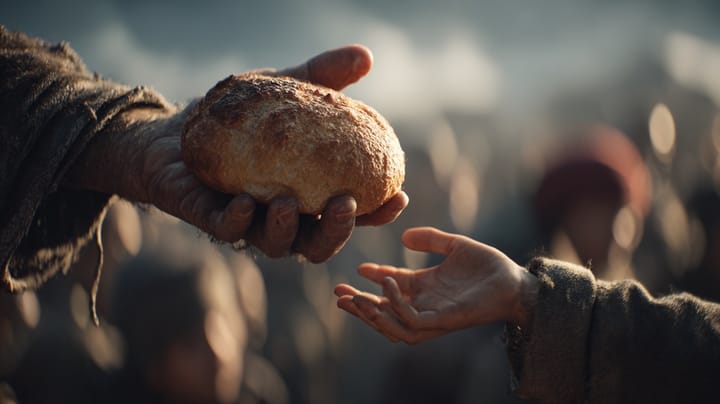Fairhaven Sermon 10-22-2023
As we learn about ourselves and who God created in here, we also learn about what we have that we can offer to others. The question then is, what is God calling us to offer to the body of Christ and to the community around us? If we know what God has given us, then we know what we have to offer.

Summary
Pastor Peg discusses stewardship and giving in this sermon. She notes that we give to God because God has given so much to us, even when it feels like God is far away. She warns against idolatry and giving to things that are not of God. Peg emphasizes that we are all made in God's image and belong to God. Therefore, we should use our unique talents and gifts to serve God's purposes. She encourages the congregation to pray about how to best use their abilities and time to contribute to the church community and beyond.
Pastor Peg concludes that as we discover our God-given gifts through self-reflection and prayer, we will find fulfillment in living out God's plan for each of us.
In summary, this sermon highlights the importance of giving back to God our time, talents, and resources. Pastor Peg reminds us that everything we have is from God, so we should steward it well. She advises looking inward to understand our abilities and then looking outward to see how we can serve God and others.
Transcript
Well, welcome to week three of our month-long series on stewardship. And just to give a quick recap, last time when I was here with you two weeks ago, I preached on thinking as we give, who is it that we are giving to when we give to God? We give because we want to give back to God because God has already done so much for us. And in a lot of ways, when we give to God, we are like children giving to a parent. I mean, there's nothing that we can give God that God doesn't already have.
But when we give to God, we become more like God, just like our children become more like us as they grow up. And last week, for week two of our series, I was over at Hilltop, and we looked at giving to God from what we own. And the scripture reading then was from Exodus, and it was told the story of the golden calf, which I believe you heard last week also, how the people of Israel, when Moses was missing for 40 days on Mount Horeb, the people panicked, and they assumed that God was missing too, and they demanded that Aaron, the priest, make them a god to lead them through the wilderness. And so Aaron told them to take off all their gold jewelry they were wearing, and he made it into a golden calf, and they worshiped this idol until God and Moses put a stop to that.
We learned a number of things about stewardship in that passage, which actually kind of surprised me because I never thought of that as being a particular stewardship passage. But first off, if we ever find ourselves thinking, God has forgotten me, we need to know this is not true. The prophet Isaiah says in Isaiah chapter 49, Zion, that is Israel, has said, the Lord has forsaken me, my Lord has forgotten me. But God answers, can a woman forget her nursing child or show no compassion on the child of her womb? Even these might forget, yet I will not forget you.
See I have inscribed you on the palms of my hands. So before we give, we need to know that these words are true. We need to know that because as children of God, when we give, we give from a position of security and strength, not from weakness or fear or obligation. We need to know because if we give from fear, like the people around the golden calf did, we often end up giving to something that is an idol.
And idols are far from gone in our world today. There are quite a few out there who would be very happy to take our money. So we can be sure that God remembers us. And secondly, before we give, we need to know who and what we are giving to, especially in times when God feels far away.
And I believe that we are living in times like that right now. We live in a time when, like the Israelites, we are waiting for God. We are waiting for God to renew our churches. We are waiting for God to set things right in our nation and in our communities.
We are waiting for God to put an end to the floods and the fires and the earthquakes and the wars that we see all around us. We are living in a time when people are looking at each other and saying, Jesus has got to be coming back soon. Don't believe it. Don't believe it.
In times like these, beware of idols. In times like these, where it comes to giving, we begin with prayer. We ask God what God wants us to do. We take time to listen for God's answers.
And when we give, what we give is between us and God. Nobody else's business. So that's a quick summary of what I shared with Hilltop last week. This week, we have a different scripture and a different way of looking at giving.
So to set the scene for the scripture for today, our scriptural reading for this week from Matthew takes place during Holy Week. Palm Sunday has already happened, and unknown to the disciples at this point, the cross is only a few days away. Jesus is using the time he has left to be in the temple, teaching the people, and they are hanging on every word. They are into this.
And suddenly we see a group coming toward Jesus to ask a question. Now the group is made up of the disciples of the Pharisees. I noticed the Pharisees themselves didn't bother to come. They sent the seminarians.
I was thinking that's kind of interesting. And also the Herodians. Now this is a really weird alliance because these two groups usually hate each other. They hate each other because the Pharisees oppose Rome.
They oppose Roman occupation. They don't like Roman officials. They hate everything about Rome. They want control of Israel to be returned to Israel.
The Herodians, on the other hand, are supporters of Herod, who is the puppet king ruling under Rome's authority. So they are total opposites, except that they both agree that Jesus is dangerous. So they come together to try to catch him in a question. And the question is this.
Is it lawful to pay taxes to the emperor or not? And the answer to this, of course, depends on which set of laws one is obedient to. The Roman law or the law of Moses? The Herodians, who support Rome, of course say yes to the tax. The Pharisees oppose it for two reasons. First off, this tax that they're talking about makes it possible for the emperor to oppress the people.
Basically, they are paying their oppressors to oppress them. And secondly, the coin used to pay the tax has a picture of the emperor on it, and the emperor thinks he's a god. So even just owning that coin means having a false god in your house. The coin was, as one theologian recently said, a bite-sized bit of blasphemy.
So if Jesus defends the people and the faith by saying no to the emperor and the emperor's tax, that's treason. And a charge like that could get him crucified. So Jesus' answer to the question is as deep as it is brilliant. He says, show me the coin.
Whose likeness is this? Caesar's, they say. And Jesus answers, give to Caesar what is Caesar's, and give to God what is God's. Now if this conversation happened today, Jesus might have said, give to Washington what is Washington's, right? And give to God what is God's. The most important point that he's making is that we are created in God's likeness.
Human beings, each one of us without exception, is made in the image of God. And that's true no matter where a person is from, whether it be America, Europe, Asia, Africa, South America, you get the idea. Every human being is created in God's likeness. The tragedy of life here on earth is that people forget that.
And as a result, there's a lot of pain in the world. And when we're hurting, we tend to forget who we are and whose we are. But no matter what life brings us, we are made in God's image. Not that we look like God, because God is a spirit, but our ability to think, to reason, to feel, to love, to experience empathy.
This is what God is like. And we were designed by God to be like God. Therefore, when it comes to paying the taxes, which people in all times and all places have found to be a burden, I mean, what is that saying about the only two things certain in life are death and taxes, right? But if the emperor wants this cheap metallic stuff, if the emperor wants this, let him have it. In the long run, this is worthless.
I mean, that coin with Caesar's face on it that people fought and died for back then, you couldn't buy a stick of gum with that today. And a hundred years from now, this won't be worth anything. Now, it's worth that much now, but this won't be worth anything either. People will be using crypto and they'll be killing each other over nothing, literally.
But for eternity, we are made in the image of God, and this is worth infinitely more because God has made us for eternity. God's image, like God, lasts forever. This also means that people who bear God's image belong to God. We are God's to care for, to love, to teach, to lead as God sees fit for God's purposes.
God made each one of us unique to fit the times and the places in which we live. Not only are all of us different, but the experiences that make up our lives are different so that no two of us is ever exactly alike and no two of us ever experiences life exactly the same way. For this reason, we are able to work in tandem with one another to help one another, which is God's plan. And this leads us to the third thing to consider about stewardship, and that is the stewardship of our time, our talents, and our abilities.
One theologian puts it this way, stewardship includes participating in God's mission, listening to God's law, doing justice, loving kindness, a way of life that includes opposing cruelty, injustice, and arrogance in all their forms. The question then becomes, what has God gifted me to do? And this may or may not have anything to do with our careers. The question deals with the raw materials that God has put in here. In a sense, we grow into self-knowledge throughout our lives.
We never stop learning about ourselves, but there are a few things that usually remain constant. And what I'm talking about here, just in this case, to some extent is kind of, remember the old book called What Colors Your Parachute? By the way, that thing is still being published. I just looked it up. It's still out there.
But the book is designed to help people plan their careers. But it does a lot more than that. It asks questions not only about what we study in school, but about things like, do we work better in large groups or in small groups or on our own? Do we prefer a lot of direction from our bosses, or do we prefer to work independently? Do we learn well from books, or do we prefer to hear people explain things? Answers to these questions and others like them tell us a lot about what God has created in each one of us. And there are no right or wrong answers, just an amazing variety of combinations, which is exactly what God intended.
So as we get to know ourselves during adolescence and beyond, we discover our purpose, or maybe a handful of purposes for our life. We begin to learn with joy who we are and why we're here. And the lectionary book that we're working from says that God has marked every human with a role, an image, and an identity that comes with challenge, joy, and fulfillment. So as we learn about ourselves and who God created in here, we also learn about what we have that we can offer to others.
The question then is, what is God calling us to offer to the body of Christ and to the community around us? If we know what God has given us, then we know what we have to offer. And like any type of giving, giving from our time and talents begins with prayer. We talk to God and we ask God what God would have us share from the many gifts that God has given us. Some of the gifts we might discover in ourselves might include things like the ability to empathize, the ability to comfort others, the ability to welcome strangers, the ability to advise or offer wisdom, the ability to see through nonsense—I like that one—the ability to have faith in others, the ability to heal, the ability to teach.
This is just a tiny sampling of the gifts that God gives. We can pray about this and ask others who know us what they see in us that could be of help to others. And the answer to this prayer and God's direction for how we share will be different for each one of us. So keep asking God and keep listening for the answers.
And may God bless our efforts to discover what God has created in us and to discover the joy of living into God's plan. Amen. Thank you. Thank you.


